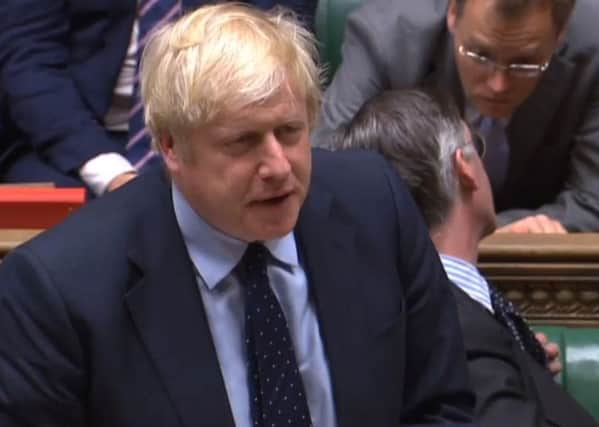The art of the possible has become the art of the impossible


This week the prime minister, Boris Johnson, must be feeling it has become the art of the impossible.
With the House of Commons and many of his own MPs rebelling against his ‘do or die’ exit from the EU on October 31 his only option was to call an election.
Advertisement
Advertisement
But because of the fixed term parliament act, agreed when the Conservatives were in coalition with the Liberal Democrats, that is not in his gift.
He is, for now, in the words of one cabinet members – with the expletives removed - snookered.
The only card he can play is compromise. Theresa May, who he helped bring down by voting against her Withdrawal Bill, must be having a discrete laugh at the mess her successor finds himself in.
This is all fascinating to watch, but at the end of the day it is a game being played with the future livelihoods of millions of families on the table.
Advertisement
Advertisement
That certainly includes farmers, who, no matter how they voted in 2016, know that a no deal Brexit would be a disaster for UK agriculture. Now is not the time for a blame game, but the roots of this mess lie back in 2015, well before the referendum.
The EU was wrong to send David Cameron back to the UK with no concessions granted; Ireland was wrong not to see the risks involved in siding with the EU-27 against its biggest trading partner; Cameron was wrong to allow a poll based on a simple majority for such a complex issue.
The list of failures is endless, but we are where we are and the goal now must be to make sure that we leave the EU with a deal that is about a better future, rather than one that seeks to further inflate already over-blown political egos.
Where we are now is a far from edifying spectacle, and one likely to add weight to people’s belief that politics and democracy are not automatically the same thing. Few who voted for Brexit back in 2016 expected it to bring the chaos now in the offing, and this certainly applies to agriculture.
Advertisement
Advertisement
Many farmers wanted to escape the red tape of the CAP, but that escape is proving to be a tunnel with a bricked up end.
The promises of a new agricultural policy gentle on regulation and focussed on meeting UK needs have been forgotten.
Instead what is in the offing is an approach likely to make the worst greening aspects of the CAP look like the proverbial Sunday school picnic.
Ask most farmers what they want and it will not be about leaving or staying in the EU. What they want is some certainty about the future for farm support and markets, but that will not emerge any time soon.
Advertisement
Advertisement
Politicians have bigger fish to fry than the future of one of the UK’s great industries. The prospect of an early election is making matters worse.
With a general election the commitment to maintain farm support at similar levels to direct payments would end, unless it was written into the manifestos of the parties likely to form the next government.
That makes the future even less certain at a time of the year when farmers are making fundamental decisions about next year and beyond.
Some in the Conservative party have a bizarre faith that a trade deal with the United States would be better.
Advertisement
Advertisement
This is certainly not the case for agriculture and it is certainly not the case under Donald Trump.
This week he was again throwing his toys out of the pram over trade, imposing punitive duties on China that produced the expected retaliation from the Chinese government.
This was all about Trump appealing to his supporters who believe jobs can be brought back to the US from China, despite a massive mismatch between wage and skill levels.
When the world’s two biggest economies engage in a trade war there can be only one outcome.
Advertisement
Advertisement
It tips us closer to the global recession most analysts predict is on its way. Markets do not like uncertainty and their reaction to trade strains between the US and China and the battle over Brexit confirm that there are consequences for political failure to find compromise. What is clear from Trump’s tactics is that he has no respect for negotiated trade deals – and that would include one with the UK.